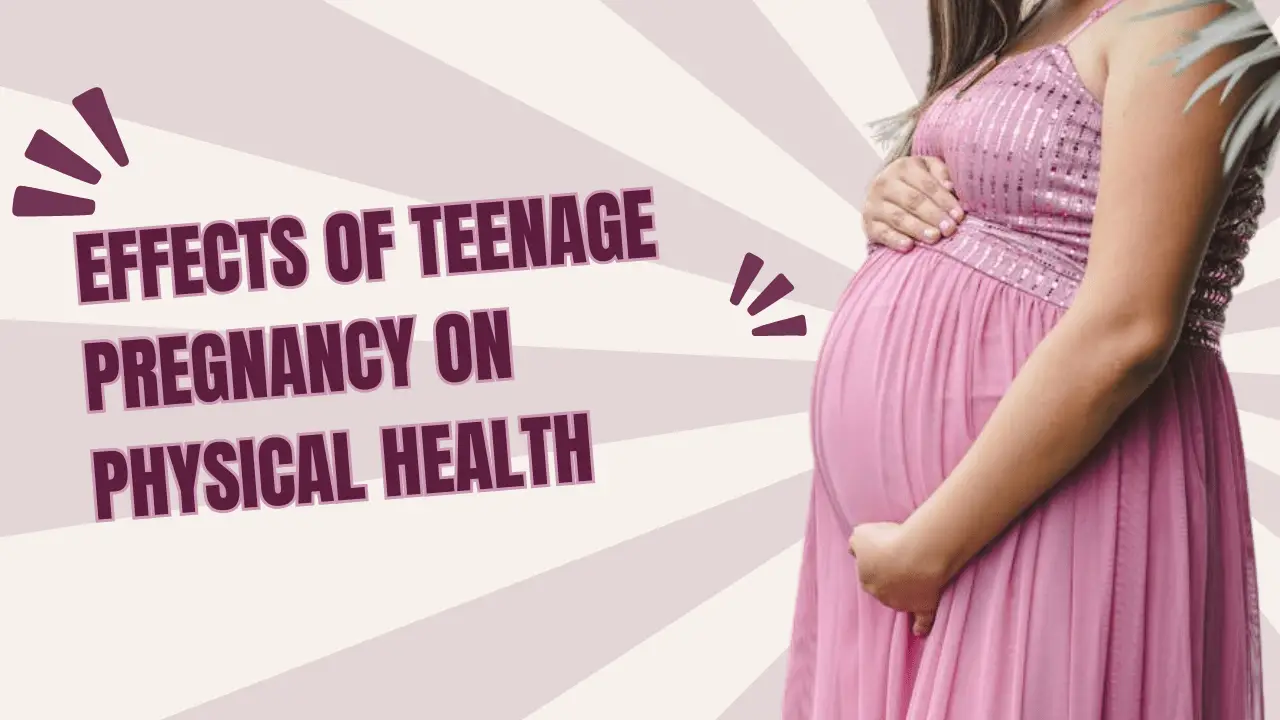Teenage pregnancy remains a significant public health issue, affecting millions of young women worldwide. This situation not only alters the lives of expectant mothers but also has profound implications for their families and communities.
Understanding the effects of teenage pregnancy on physical health is crucial for young people, parents, and educators. Teenage mothers often face numerous health risks during pregnancy, including complications that can arise both during and after childbirth.
These risks can lead to immediate challenges, such as nutritional deficiencies, and long-term consequences that affect their overall well-being and future pregnancies.
By raising awareness about these health impacts, we can empower teens with the knowledge they need to make informed decisions about their bodies and futures, while also advocating for better support systems and resources.
Understanding Teenage Pregnancy:
Teenage pregnancy is defined as pregnancy occurring in young women typically aged 13 to 19 years. It is a complex issue influenced by various social, economic, and cultural factors.
Understanding teenage pregnancy is essential to address the challenges it presents, particularly regarding the effects of teenage pregnancy on physical health and overall life outcomes for young mothers and their children.

Definition and Prevalence
Teenage pregnancy has become a critical global concern, with millions of adolescents giving birth each year. While rates of teenage pregnancy have declined in some regions, it remains prevalent in many parts of the world, especially in low-income areas where access to education and healthcare is limited. In the United States, for example, about 17% of all pregnancies are among teenagers, highlighting the need for comprehensive awareness and education around this topic.
Common Reasons for Teenage Pregnancies
Several factors contribute to teenage pregnancies, often interlinked with socioeconomic conditions.
- Lack of Sexual Education: Many teens do not receive adequate sexual education, which leaves them uninformed about safe sex practices, contraception, and the implications of pregnancy.
- Peer Pressure: The desire to fit in or be accepted by peers can lead to risky sexual behavior among teenagers, increasing the likelihood of unplanned pregnancies.
- Socioeconomic Factors: Teens from lower socioeconomic backgrounds may have fewer resources and support systems, leading to higher rates of teenage pregnancy. Limited access to contraceptives and healthcare further exacerbates this issue.
- Family Dynamics: A history of teenage pregnancy in families can create a cycle, where young women may not see the challenges or consequences of early pregnancy, leading them to repeat the pattern.
- Cultural Influences: In some cultures, early marriage and childbirth are normalized, which can contribute to higher rates of teenage pregnancies.
Implications of Teenage Pregnancy
Understanding teenage pregnancy goes beyond acknowledging its prevalence; it also involves recognizing its implications for young mothers and their children. The effects of teenage pregnancy can be profound, impacting the physical health of mothers, as well as their educational and career opportunities.
Teenage mothers are at a higher risk for various health complications, including preterm birth, low birth weight, and mental health issues.
Additionally, the stigma surrounding teenage pregnancy can lead to social isolation, affecting the mental well-being of young mothers. As they navigate these challenges, it is crucial to provide support, education, and resources to empower them and help mitigate the negative effects of their situation.
Immediate Physical Health Effects:
The immediate physical health effects of teenage pregnancy can significantly impact the well-being of young mothers and their babies. Adolescents’ bodies are still developing, and the physiological demands of pregnancy can pose unique challenges and risks.
Understanding these immediate health effects is crucial for ensuring that teenage mothers receive the necessary care and support throughout their pregnancy.

Risks to Maternal Health
- Anemia: Teenage mothers are at a higher risk of developing anemia due to inadequate nutrition or increased iron demands during pregnancy. Anemia can lead to fatigue, weakness, and complications during labor and delivery.
- Gestational Hypertension and Preeclampsia: Young mothers may experience high blood pressure during pregnancy, leading to gestational hypertension or preeclampsia. These conditions can result in serious health complications for both the mother and baby if not properly managed. Symptoms include severe headaches, swelling, and sudden weight gain.
- Preterm Labor: Teenage mothers are at an increased risk of preterm labor, defined as labor that begins before 37 weeks of gestation. This can result in premature birth, which is associated with a higher risk of health complications for the infant, including respiratory issues, low birth weight, and developmental delays.
- Low Birth Weight: Babies born to teenage mothers are more likely to have low birth weight, which can occur due to inadequate prenatal care, poor nutrition, or health complications during pregnancy. Low birth weight can lead to long-term health problems, including developmental delays and chronic health issues.
- Infections: Teenage mothers may be more susceptible to infections, including urinary tract infections (UTIs) and sexually transmitted infections (STIs), which can further complicate pregnancy and affect the health of both the mother and the baby.
Emotional and Psychological Effects
In addition to the physical risks, the emotional and psychological impact of teenage pregnancy should not be overlooked. Young mothers may experience anxiety, depression, and stress related to their changing bodies and the challenges of impending motherhood. These emotional struggles can exacerbate physical health issues, creating a cycle of poor health outcomes.
Importance of Prenatal Care
Given the numerous immediate health risks associated with teenage pregnancy, access to comprehensive prenatal care is essential. Regular check-ups can help monitor the health of the mother and baby, manage complications, and provide vital education about nutrition, exercise, and health during pregnancy.
By understanding the effects of teenage pregnancy on immediate physical health, stakeholders, including parents, educators, and healthcare providers, can work together to support young mothers effectively. Early intervention, education, and resources can significantly improve health outcomes for teenage mothers and their infants, promoting healthier pregnancies and brighter futures.
Long-Term Physical Health Consequences:
While the immediate physical health effects of teenage pregnancy are well-documented, it is equally important to understand the long-term physical health consequences that can arise for both the mother and child. These long-term impacts can affect a young mother’s health for years, influencing her overall quality of life and future pregnancies.
Chronic Health Issues for the Mother
- Reproductive Health Complications: Teenage mothers may face various reproductive health issues later in life, including irregular menstrual cycles, pelvic inflammatory disease (PID), and complications during subsequent pregnancies. These conditions can result from the physical and emotional stresses associated with early childbirth.
- Higher Risk of Subsequent Pregnancies: Young mothers who give birth during their teenage years are more likely to experience subsequent pregnancies at an early age. This trend can create a cycle of repeated pregnancies during adolescence, leading to compounded health risks and challenges.
- Cardiovascular Health: Some studies suggest that teenage mothers may be at an increased risk for cardiovascular diseases later in life. The physiological stress of pregnancy, combined with potential complications such as hypertension, can have long-term effects on heart health.
- Mental Health Issues: The emotional challenges of being a teenage mother can lead to long-term mental health problems, including anxiety and depression. These issues can persist long after the birth of the child and may affect the mother’s ability to care for her child, maintain relationships, and pursue educational or career opportunities.
- Nutritional Deficiencies: Many teenage mothers struggle with proper nutrition during and after pregnancy. This can lead to long-term health problems, including obesity, diabetes, and osteoporosis. Nutritional deficits may not only affect the mother but can also influence her child’s health and development.
Impact on the Child’s Health
The long-term physical health consequences of teenage pregnancy extend beyond the mother. Children born to teenage mothers may also face various health challenges:
- Developmental Delays: Infants born to young mothers are at a higher risk for developmental delays, which can affect cognitive and motor skills. These delays may impact their academic performance and social interactions as they grow.
- Chronic Health Conditions: Children of teenage mothers are more likely to experience chronic health conditions, such as asthma and obesity. These health challenges can result from a combination of genetic factors and the environmental stresses of being raised in less stable households.
- Socioeconomic Challenges: Children of teenage mothers are often more likely to grow up in low-income households, which can impact their access to healthcare, nutrition, and educational opportunities. This socioeconomic disadvantage can create a cycle of poor health outcomes that persists across generations.
- Higher Risk of Teenage Pregnancy: There is evidence suggesting that children of teenage mothers are at an increased risk of becoming teenage parents themselves, perpetuating the cycle of teenage pregnancy and its associated health risks.
Nutritional Needs and Challenges:
Proper nutrition is critical during pregnancy, especially for teenagers whose bodies are still developing. Meeting the nutritional needs of pregnant adolescents is essential for their health and the health of their babies. However, many teenage mothers face unique challenges that can impede their ability to maintain a balanced diet, leading to potential complications.
Essential Nutritional Needs
- Increased Caloric Intake: Pregnant teens require more calories than non-pregnant adolescents to support their growing bodies and the development of their babies. On average, teenage mothers need about 300 additional calories per day during the second and third trimesters.
- Key Nutrients: Several nutrients are particularly vital during pregnancy:
-
- Folic Acid: Crucial for preventing neural tube defects, folic acid is essential for fetal brain and spinal cord development. Teenage mothers should aim for at least 600 micrograms daily.
- Iron: Pregnant adolescents are at a higher risk of anemia, making adequate iron intake important to support increased blood volume. The recommended daily intake is around 27 milligrams.
- Calcium: Necessary for fetal bone development, pregnant teens need about 1,300 milligrams of calcium each day.
- Protein: Essential for the growth of fetal tissues, including the brain, teenage mothers should consume around 71 grams of protein daily.
Nutritional Challenges
Despite these essential needs, many teenage mothers encounter significant barriers to achieving adequate nutrition:
- Lack of Education: Many young mothers lack the knowledge or resources to make informed dietary choices. This gap in education can lead to unhealthy eating habits and nutritional deficiencies.
- Socioeconomic Factors: Limited financial resources can restrict access to healthy foods, forcing some teenagers to rely on cheaper, processed options that are high in sugars and fats but low in essential nutrients.
- Emotional Stress: The emotional and psychological challenges of pregnancy can affect appetite and eating behaviors. Stress and anxiety may lead to unhealthy eating patterns, such as binge eating or neglecting meals altogether.
- Cultural Influences: Cultural beliefs and practices surrounding food can impact dietary choices. Some adolescents may face pressure to conform to traditional diets that may not meet their nutritional needs.
Understanding the effects of teenage pregnancy on nutritional needs and challenges is crucial for providing appropriate support. By offering education, resources, and access to healthy foods, healthcare providers can help teenage mothers meet their nutritional needs, ultimately improving health outcomes for both mothers and their babies.
Mental Health Considerations:
Mental health is a critical aspect of overall well-being, particularly for teenagers experiencing pregnancy. The transition to motherhood at a young age can introduce a range of emotional and psychological challenges that significantly impact both the mother and her child.
Understanding these mental health considerations is essential to address the effects of teenage pregnancy effectively.
Emotional Challenges
- Anxiety and depression: Unplanned pregnancies, social stigma, and the demands of being a new mother are just a few of the stresses that put teenage moms at risk for developing anxiety and melancholy. These mental health issues can lead to feelings of isolation, hopelessness, and overwhelm, making it difficult to cope with the demands of parenting.
- Identity and Self-Esteem Issues: Adolescence is a critical period for identity development. Becoming a mother at this stage can complicate a teenager’s sense of self and alter their future aspirations. Many young mothers struggle with self-esteem and body image issues as they navigate the physical and emotional changes of pregnancy.
- Social Isolation: Teenage mothers may experience social isolation due to stigma and judgment from peers and family members. This isolation can exacerbate feelings of loneliness and increase the risk of mental health disorders, as supportive relationships are crucial for emotional well-being.
Support Systems
Access to support systems plays a vital role in mitigating these mental health challenges. Engaging with family, friends, and community resources can provide the emotional support young mothers need. Counseling services and support groups can also offer a safe space for teenage mothers to express their feelings and connect with others facing similar challenges.
Long-Term Implications
The mental health issues arising from teenage pregnancy can have long-lasting effects. Unaddressed mental health challenges can impact a mother’s ability to provide adequate care for her child, potentially leading to adverse developmental outcomes for the child.
Therefore, prioritizing mental health support for teenage mothers is essential for promoting healthier outcomes for both mothers and their children.
By recognizing the mental health considerations associated with teenage pregnancy, stakeholders can implement effective interventions and support systems to help young mothers navigate this challenging period, ultimately reducing the effects of teenage pregnancy on their mental well-being.
Preventive Measures and Education:
Preventive measures and education are essential components in addressing the effects of teenage pregnancy. By providing teenagers with the right information and resources, we can empower them to make informed decisions about their sexual health and reproductive rights.
Effective education and preventive strategies can significantly reduce the incidence of teenage pregnancies and promote healthier futures for adolescents.
Comprehensive Sexual Education
- Informed Decision-Making: Comprehensive sexual education programs should cover topics such as human reproduction, contraception options, sexually transmitted infections (STIs), and healthy relationships. By educating teenagers about their bodies and choices, they can make informed decisions that align with their values and goals.
- Access to Contraceptives: Educating teens about the various contraceptive methods available, including hormonal options, barrier methods, and long-acting reversible contraceptives (LARCs), can significantly reduce unintended pregnancies. Programs that facilitate easy access to contraceptives empower young people to take control of their sexual health.
- Communication Skills: Teaching teenagers effective communication skills can enhance their ability to discuss sexual health with partners and healthcare providers. Open dialogue about boundaries, consent, and sexual health is vital for healthy relationships and reducing the risk of unplanned pregnancies.
Community Support and Resources
- Parental Involvement: Engaging parents in discussions about sexual health and relationships is crucial. Parents can play a significant role in their children’s education by creating an open environment where teens feel comfortable discussing sensitive topics.
- Youth-Friendly Services: Providing accessible healthcare services tailored to the needs of teenagers can encourage them to seek guidance and support. Clinics that offer confidential services, counseling, and educational resources can help young people navigate their reproductive health.
- Mentorship Programs: Establishing mentorship programs that connect adolescents with positive role models can provide guidance and support. Mentors can share their experiences, offer advice, and encourage teens to pursue their educational and personal goals.
Conclusion:
In conclusion, addressing the effects of teenage pregnancy requires a multifaceted approach that emphasizes education, prevention, and support. By providing comprehensive sexual education and access to resources, we can empower teenagers to make informed decisions about their reproductive health.
Furthermore, fostering open communication within families and communities is crucial in creating an environment where young people feel supported. Ultimately, investing in preventive measures not only benefits teenage mothers but also promotes healthier futures for their children and society as a whole. Click to learn more.
FAQs:
1. What are the immediate effects of teenage pregnancy?
Immediate effects of teenage pregnancy can include physical health complications, such as anemia, high blood pressure, and increased risk of premature birth. Emotional challenges, like anxiety and stress, are also common as teens navigate unexpected motherhood.
2. How does teenage pregnancy affect educational opportunities?
Teenage pregnancy often disrupts education, leading many young mothers to drop out of school. This can limit their future job prospects and earning potential, making it more challenging to achieve financial independence.
3. What are the long-term health effects of teenage pregnancy?
Long-term health effects can include chronic health issues such as reproductive complications, mental health disorders, and a higher risk of subsequent pregnancies. These issues can impact the mother’s quality of life and future pregnancies.
4. How can teenage pregnancy be prevented?
Preventive measures include comprehensive sexual education, access to contraception, parental involvement, and community support. Teens who are educated are better able to make judgments regarding their relationships and sexual health.
5. What support is available for teenage mothers?
Support options for teenage mothers include counseling services, parenting classes, financial assistance, and healthcare resources. Community organizations often provide programs to help young mothers navigate their new responsibilities while pursuing their education and personal goals.
